Lian Tanner's Blog, page 6
May 25, 2019
A childhood story becomes a picture book
My parents met and married in the Northern Territory during the Second World War. My father was a soldier just returned from Palestine. My mother was an army nurse.

That time in the Northern Territory was only a small part of their lives, but it became enormous in the stories they told us. Stories of Mum driving an army truck at immense speed through camp in the middle of the night. Of Dad saving her from drowning. Of a pet wallaby, an army major who went ‘troppo’, and a host of other characters.
Stories of the hot days and the cold nights and the red, red dirt.
So it was no great surprise to me when that same red dirt turned up in an idea for a picture book. And on Friday, I got to hold that book in my hand for the very first time.


It is utterly beautiful.
The post A childhood story becomes a picture book appeared first on Lian Tanner.
May 18, 2019
Why are stories so important?
My dad was a storyteller. It’s not a hard thing to be in Tasmania, which is packed to the brim with strangeness, beauty and tragedy.
So when my brothers and I were kids, on the long drives from Launceston to Hobart to visit family, Dad would tell us stories about the Halfway House, the Disappearing House, the champion ram’s skull that was nailed to a telegraph pole just south of Oatlands, and the mud brick walls where convicts used to be chained at night.
And because he knew that a good story was more important than the absolute truth, he would also point out the tumbledown cottage where the three little pigs used to live.
It was a good way to entertain four children on an otherwise boring drive. But for me, it was also the beginning of a long and stubborn desire to be a storyteller myself.
What is it about stories? They are such a deep part of being human. Why do we love them so much? Why are they so important?
“There have been great societies that did not use the wheel, but there have been no societies that did not tell stories.” Ursula le Guin
When I was a teenager, my teachers told us it was tools that made us human. Then they said it was language. Turns out they were wrong both times. Other species use tools. Other species use language. But as far as we know, humans are the only ones who tell stories.
As far as we know.
The post Why are stories so important? appeared first on Lian Tanner.
May 4, 2019
Writing advice #3 – be stubborn
Many years ago, I sent the first three chapters of Museum of Thieves to Peter Bishop from Varuna Writers House in the Blue Mountains. By then, I’d been working on the book for about two and a half years, and I was pretty sure I’d nailed it.
So I went to the subsequent meeting with Peter with all sorts of glorious fantasies running through my head. But what they all boiled down to was this: I’d walk into the room, he’d throw his arms wide and say, ‘I love it, Lian. I love it so much that I’ve already spoken to several publishers about it and they are keen to read it.’
Ha.
What he actually said was, ‘Well, I like the title.’
He then went on to say that the first three chapters were pretty boring; I was taking too long to get into the story; the world wasn’t sufficiently developed; the stakes weren’t high enough, etc etc.
I drove home from the meeting in a daze of humiliation, wondering what on earth I was going to do now. Wondering if I should just throw the whole thing out and start again.
But I woke up the next morning thinking, ‘I’ll show him!’ And I started another draft.

This is when the guardchains appeared, and the Seven Gods, and Separation Day and the bomb that destroyed the Fugleman’s office and the punishment chains and so much else. It’s when the first three chapters got thrown out the window and replaced by something much more exciting. It’s when the book finally started to take its final form.
All of it driven by the stubborn desire to prove Peter Bishop wrong. (Whereas really, I was proving him right.)
I can’t overstate the importance of stubbornness for a writer. Certainly there’s a place for taking a step away from your manuscript for a little while, and sorting out your ideas. Sometimes, throwing it out and starting again is the right thing to do.
But other times you need to dig in, and say to yourself, ‘I’ll show them.’ And keep going.
The post Writing advice #3 – be stubborn appeared first on Lian Tanner.
April 20, 2019
Writing advice #2 – practise patience
My #2 tip for up and coming writers is practise patience. This is a hard one to take on board, particularly when you’re young. In your teens and twenties, it feels as if everything has to happen NOW, and that if it doesn’t, you’re a failure.
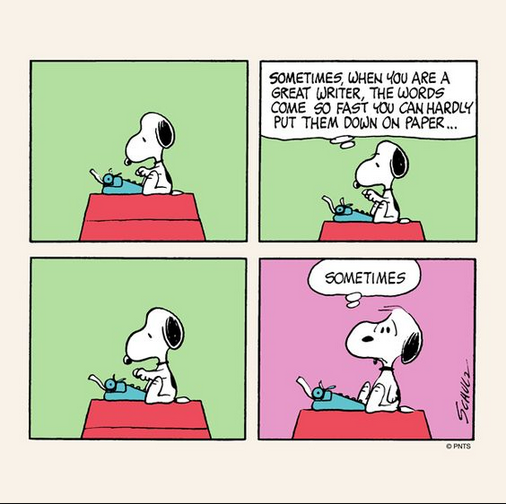
But it’s not just teens and twenties. When I was working for the Australian Script Centre, a man came into the office with a play he’d written. He would have been in his fifties, and he desperately wanted us to read his manuscript.
‘This is my one big shot at it,’ he said. ‘If it’s no good, I’m giving up.’
Which pretty much told me all I needed to know about his chances of making a career in writing.
A writing career is a long-form thing. You have to find and develop your own individual voice, which you can only do by writing a LOT. You have to learn the craft. You have to work out what you want to write about. And when the fashions change on you, you have to be ready to change with them.
This need for patience weeds out a lot of people, particularly those who want to ‘be’ writers, but don’t want to put in all the work.
Which is fine. No one has to aim for a writing career.
But if it’s what you want, practise patience.
Tip #3 next week.
The post Writing advice #2 – practise patience appeared first on Lian Tanner.
April 13, 2019
Writing advice – learn to take criticism
A young woman doing a creative writing degree at University recently messaged me with a number of questions about my career. Her last question was, ‘Can you give me three tips for up and coming writers?’
The usual advice that writers trot out is ‘read read read’ and ‘write write write’ – because both those things are basic and essential, and far too many people think they can skip them and still become a published writer.
But on this occasion I thought I’d go a little deeper.
Very early on in my career, I was commissioned to write a play for Terrapin puppet theatre. I had no idea of the process, so when I submitted my first draft, and they called me in for a meeting to discuss it, I thought they were just going to say nice things about the script, and maybe ask for a few small changes.
*hollow laugh*
The artistic director, the designer and the puppeteers sat me down and took me through every line of that script. ‘Why does this happen?’ they asked. ‘Why does it happen now?’
It was one of the most traumatic experiences of my writing life – and it taught me a huge amount. It also forced me to understand that, as a writer, you have to be able to take criticism. Because that’s you become a better writer.
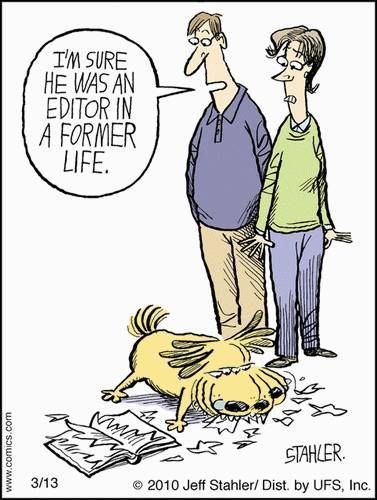
So that was my #1 tip: ‘Learn to take criticism. Your writing is your baby, and you want everyone to love it. When they don’t, it’s easy to get defensive and reject what people say, or argue with them. Resist that temptation. Listen to what they say and let the criticism sit with you for a while before you decide to accept or reject it.’
#2 tip next week.
The post Writing advice – learn to take criticism appeared first on Lian Tanner.
April 6, 2019
Ella and the Ocean – the cover!
I am wildly excited about this book. It’s my eleventh book, but it feels like my first – probably because it’s so different from anything else I’ve written. And because seeing what Jonathan Bentley has brought to the illustrations is so beautiful and so moving.
So here at last are the front and back covers, with Ella in her little elastic-sided boots, and that astonishing landscape spreading out before her.
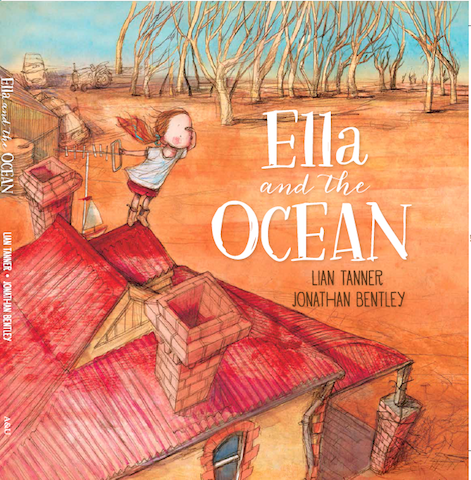
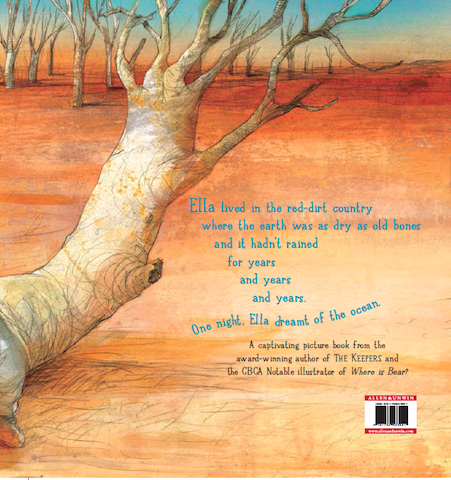
Latest word is that the book will be out in August.
The post Ella and the Ocean – the cover! appeared first on Lian Tanner.
March 23, 2019
Writing Advice – it’s not just about the writing
Some time ago, a twelve-year-old girl wrote to me for advice. Her mother, she said, thought she was too young to be a writer, and wanted her to go outside and do other things. What should she do?
I was the same at her age, so I sympathised. Given half a chance, I would have spent 90% of my time indoors, either reading or writing. But I also sympathised with the mother. One of the reasons my parents let me get a horse in my last year of primary school was because they were worried about that 90%. When Mum died, I found some old writings where she described me as her ‘shy bookworm of a daughter’, and rejoiced in the changes that the horse brought.
The classic advice that writers give to children who want to write is, ‘Read read read and write write write.’ It’s good advice, but there’s more to it. I didn’t realise it when I was twelve, but it’s not just about the writing. If you want to be a writer, you have to go out and live life. That’s what gives you something to write about. That’s what gives you depth of character, depth of description, and a moral code that underlies your work.
So that’s more or less what I said to this girl. I supported her love of reading and writing, but then I said, ‘However your mother is also right, in that you must LIVE life, and not just read about it. To be a writer, you need to observe people.

‘You must think deeply about why people behave the way they do, and try to understand them – even people you dislike. You must listen to the way they speak and watch how they walk, and see what they do when they are happy or sad or frightened. You must put yourself in their shoes.
‘You must try and understand yourself too – which is not always easy. Only then will you be able to write convincing characters. It is all research, you see. So don’t forget this, when your mother wants you to do something other than reading. She may not realise it, but she is sending you off to do research.’
I still think it’s one of my best answers ever.
The post Writing Advice – it’s not just about the writing appeared first on Lian Tanner.
March 16, 2019
Reading the Aurealis shortlist
I’m setting out to read the shortlist for this year’s Aurealis award for Best Children’s Fiction. First on the list is Jaclyn Moriarty’s The Slightly Alarming Tale of the Whispering Wars.

This is the story of the orphans of Spindrift, and their war with the very privileged children of the Brathelthwaite Boarding School – a war that turns into an alliance when the real war begins.
For a while now, children have been disappearing, and a magical flu has been laying waste to the Kingdom of Gusts, Gales, Squalls and Violent Storms. When the queen realises the Whispering Kingdom is behind both the disappearances and the flu, she joins the neighbouring Kingdoms in declaring war. Soon, Witches and Radish gnomes are attacking Spindrift, the ground is falling out from underneath people’s feet, and no one is safe.
That’s when two mysterious visitors from the future tell the orphans and the boarders that they must work together to retrieve the missing children.
I loved this book so much. It’s wildly imaginative, beautifully written and, in places, ridiculously funny. It’s a follow-on of sorts from The Extremely Inconvenient Adventures of Brontë Mettlestone, but it’s also very much a stand-alone, and could easily be read on its own.
Highly recommended.
The post Reading the Aurealis shortlist appeared first on Lian Tanner.
March 8, 2019
Museum of Thieves revisited – the names
One of the Year Six classes at Dodges Ferry primary school is currently reading Museum of Thieves, and I’ve been invited to talk to them – which has sent me looking through my old notebooks.
I didn’t really know what I was doing when I was writing Museum. The whole thing was a learning process, which is why I rewrote it more than twenty times over a three-year period. And the story in the early drafts was nothing like the one that was eventually published.
Some things were the same; Goldie was always the central character, and the museum was always there. Fingertalk was part of the story from the beginning, and so were the guardians (though they weren’t the Blessed Guardians at that stage). In fact, the very first draft began like this:

But so much else was different, mainly because I didn’t yet know much about the world I was writing into existence. And one of the important things I didn’t know was the system whereby parents gave their children names that were lucky or fortunate or brave, in the belief that it would help keep them safe.
So the guardian in that first draft was called Guardian Kyte, not Guardian Hope. Goldie’s friends were Bree and Jorn and Eddie, rather than Jube (Jubilation), Fort (Fortitude) and Glory. And the boy who eventually became Toadspit was called Lionel.
I can hardly believe it now. Lionel? What was I thinking? Luckily, he turned into Toadspit fairly quickly, which suited him much better.

And that’s exactly why we have second and third (and twentieth) drafts. So we can find the story that’s meant to be there. And the right names.
The post appeared first on Lian Tanner.
March 2, 2019
2018 Aurealis Award Shortlist
The very first of my books to appear on a shortlist was Museum of Thieves, in the 2010 Aurealis awards for Australian fantasy/science fiction. It was wildly exciting seeing it there, and even more exciting when it went on to win (even though they mistakenly named it as The Keepers on the award itself).
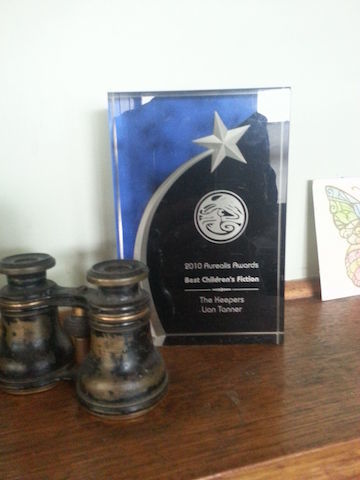
The following year, City of Lies (The Keepers #2) was also shortlisted, and also won. Which made me a bit cocky, to be honest. So I was disappointed when, a year later, Path of Beasts (The Keepers #3) DIDN’T make the shortlist – though my eldest brother kindly put it in terms of ‘letting other people have a turn’.
Shortlists like this are so important in terms of recognition (and feeling appreciated), and I never get tired of finding myself on one of them. So I was really pleased to see Secret Guardians (The Rogues #2) on the 2018 list.

And now I’m setting out to read the other books on the list. Most of these authors have either won the Aurealis at least once before, or been shortlisted for it, so it’s a good field, and a good way of finding out what’s going on in Australian speculative fiction.
I noticed yesterday that the shortlist for the New South Wales Premier’s award has also come out. I’m not on it, but my fellow Tasmanian Julie Hunt is, with her latest children’s book Shine Mountain.
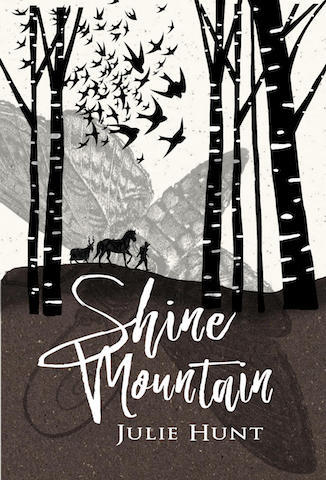
Julie’s books are bighearted and beautifully written, and Shine Mountain is no exception. I hope she wins.
The post 2018 Aurealis Award Shortlist appeared first on Lian Tanner.



